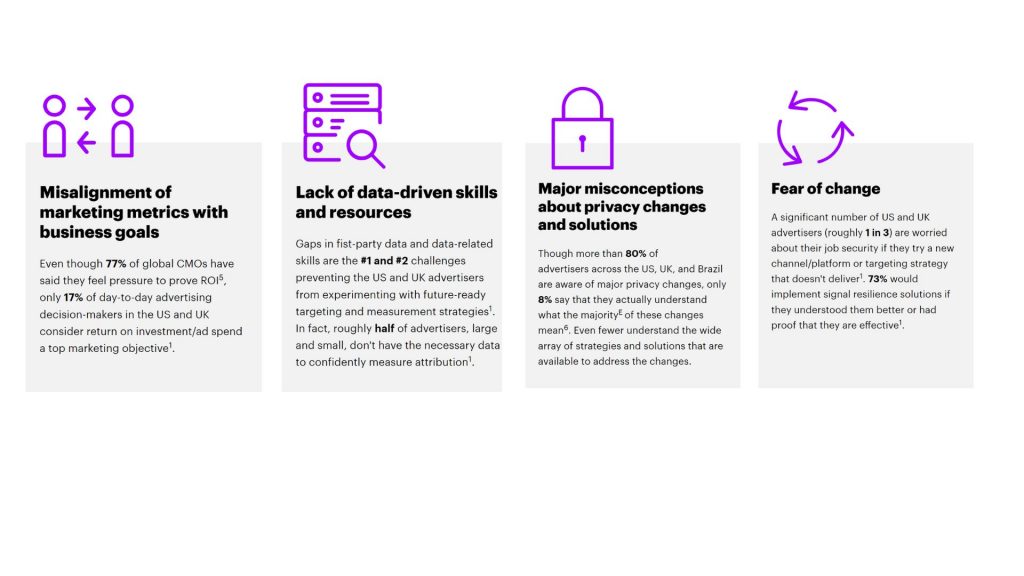Marketers are being forced to find different ways to advertise due to privacy regulations phasing out data tracking elements such as cookies. Cookies are (or were) great because they allowed marketers to retarget audiences, but that’s all changing – as a new report from Accenture has highlighted.
The report is put together using research on SMB and enterprise advertisers and enriched by surveys of over 500 advertising decision-makers, plus interviews with industry leaders.
Big impacts
The report says that around 50% of advertisers have seen campaigns negatively impacted by privacy changes, while the same number expect further privacy clampdowns to reduce campaign effectiveness.
Marketing efficiency is also on the way down. Due to the drop-off in third-party identifiers like cookies, there could be a 10-30% drop in reporting efficiency. That’s a lot!
Small response
Despite those negative impacts, 45% of US and UK reports say they’ve been using the same approach to advertising for the last five years and 71% of them won’t change their strategy in the next year.
Because of the economic downturn, 74% of ad budgets have been reduced and 47% of advertisers say they’ve struggled with increased costs. Both those areas are making life difficult for marketers. That’s bad, and you’ll find out why below.
Barriers to change
One reason for the hesitancy could be that marketers don’t properly understand what the privacy changes mean in practice.
Accenture, Building an intelligent foundation for navigating the attention economy
“Though more than 80% of advertisers across the US, UK, and Brazil are aware of major privacy changes, only 8% say that they actually understand what the majority of these changes mean. Even fewer understand the wide array of strategies and solutions that are available to address the changes.”
Furthermore, there appears to be a misalignment between marketers and people defining business goals. 77% of global CMOs say they feel pressure to prove ROI on marketing spend, only 17% of advertising decision-makers in the US and UK consider return on investment a marketing objective.
There is also a lack of data-related skills that allow advertisers to measure attribution in a cookie-less world. More training and understanding seems to be required!
Lastly, fear of change is holding people back. Around 33% of US and UK advertisers feel that their job could be in the line if they try something new that doesn’t work.
Here’s seven ways you can change that
To solve some of that, Accenture revealed seven recommendations for making progress.
Build out your own data
Gather your own data so you don’t need to rely on third-parties such as cookies. Having your own data is good for two reasons. First, it allows you to deliver the customer an experience they expect and second, it can let you measure the impact of your efforts better.
Test without disrupting
Advertisers need to test solutions that rely on the context of the user’s onsite intent such as interest-based marketing.
ROI measured as a dollar return
To get advertisers and executives speaking the same language, shift your definition of ROI to dollars returned to the business. So, for every campaign, measure ROI on how much money it made you.
Build measurement and attribution capabilities
According to the report, 65% of US and UK advertisers use last-click attribution to optimise ongoing campaigns – a method that can be inaccurate and depends on cookies. It’s not a method that’s made to last.
Accenture, Building an intelligent foundation for navigating the attention economy
“They need to invest in better marketing-mix models (MMM) with more frequent data refreshes that update at the tempo of business decisions. More advanced advertisers can embed AI into their models to accelerate speed to insights (including optimization recommendations) and greater granularity.”
Embrace AI and creators
Embrace AI to drive ad personalisation and improve efficiency. Explore content creator partnerships to tap into what audiences love and build deeper connections between them and your brand.
Those two strategies can create stronger relationships with audiences and take advertising creative to new levels.
Invest in technology
Advertisers need to see the whole picture – and to do that costs money. Invest in solutions that let advertisers see customers’ and audiences’ non-linear purchase journeys across devices and touchpoints.
That investment will help solve privacy changes and create new opportunities.
Make everyone responsible
Advertisers and the rest of the business should come together to focus on the whole funnel. Having siloes throughout the company is bad for everyone, and a thing of the past.
Accenture, Building an intelligent foundation for navigating the attention economy
“To that end, advertisers need to build cohesive, connected teams and KPI strategies so that every marketing team and every campaign is unified by shared business goals and measurement.”




RECOMMENDED FOR YOU
Google Rebuilds Checkout For AI Shopping
Agentic shopping has moved from theory to reality, and…
Agentic shopping has moved from theory to reality, and…
LinkedIn Boosts Brand Ads With AI Tools
LinkedIn is expanding its advertising capabilities with a new…
LinkedIn is expanding its advertising capabilities with a new…
LinkedIn Streamlines B2B Influencer Marketing
LinkedIn has introduced a more intuitive way for brands…
LinkedIn has introduced a more intuitive way for brands…